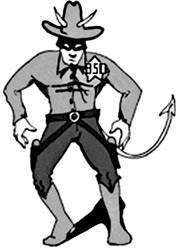![[Metroactive Features]](/features/gifs/feat468.gif)
[ Features Index | San Jose | Metroactive Central | Archives ]
Techsploitation
Whatever Happened to BSD?
By Annalee Newitz
FOR PEOPLE WHO HACK, who build the infrastructure that makes Flash movies swim, website images are nothing. Code is everything. Among these back-enders, there is a 25-year-old legend known as BSD (Berkeley Software Distribution).
Of course, BSD is hardly a legend in the traditional sense, seeing as it refers to an actually existing operating system (OS) and set of networking tools invented by a bunch of weirdo geniuses at UC-Berkeley back in the mid-1970s. There are NetBSD, BSD/OS, OpenBSD and FreeBSD. Perhaps most weirdly, at least to open-source twerps like myself, BSD is both open source AND proprietary.
Quite frankly, until about a month ago, nobody could really figure it all out. (Except possibly Andrew Leonard, poet and philosopher of the open-source movement, whose history of BSD will be available shortly as part of his online book The Free Software Project [http://www.salon.com/tech/fsp/index.html].)
Buried at the heart of the BSD legend was a mystery. Although open-source BSD code is largely responsible for the creation of the Internet, who the hell has heard of it? Even front-enders know about Linux, another open-source operating system. But in the mid-1990s, BSD seemed to have pulled a Jim Morrison. Was it alive, dead or somewhere in South America?
Just as I was despairing of ever truly knowing what had happened to BSD, a press release materialized in my inbox. It was from BSDI (www.bsdi.com), the legendary BSD company that had locked legal horns with AT&T in 1992, when the monopolistic technoctopus declared BSDI to be in violation of some AT&T copyrights. This is the same lawsuit that led to the much-parodied idea of "mental contamination," because part of AT&T's suit against BSDI involved the accusation that some of BSDI's engineers had had their brains "contaminated" with proprietary information while they were working at AT&T's Bell Labs.
According to the press release, BSDI had been reborn as a unified entity, all set to start marketing BSD/OS and a whole host of BSD support services (intensely geeky note to self: cool!). In addition, the company is entering into a partnership with FreeBSD, the most user-friendly and fully open-source version of BSD. I had to know more. So I had a chat with Jordan Hubbard, a FreeBSD founder; Paul Borman, a member of BSDI's tech staff; and Gary Johnson, chief executive officer of the "new BSDI." Gary wanted to talk marketing, but I wanted to know about contamination and copyrights.
"I'm still mentally contaminated and proud of it," Paul said. "That lawsuit really harmed BSDI because we spent all this money we didn't have, and we couldn't move forward with our code. But BSDI deserves a lot of credit for doing that."
Indeed, it's partly because of the legal and technical work of the BSDI group that the open-source community continues to thrive today. But during the long years of BSDI's legal battle, Linus Torvalds' collectively coded OS moved in on the open-source OS territory that had once belonged to BSD alone. And BSDI, with a 20-year-old OS that is tried and true, wants to reclaim some of that lost ground.
"Linux was lucky," Jordan explains. "By the time the suit was over, we were two years behind. That's why we're called 'the Internet's best-kept secret.'"
Considering its martyr status, BSD has been surprisingly moderate when it comes to copyright politics. Its software is released under the "BSD license," which stipulates that anyone can use the code for anything--including proprietary ventures--as long as BSD is credited. This stands in stark contrast to Linux, released under GNU's General Public License, which states that Linux code must remain open-source under all circumstances. (GNU is a Free Software Foundation project.)
So if the open-source world is a political playing field, where does BSD stand?
"Well, GNU's license is a 'copyleft,' " Jordan chuckles. "The BSD license is 'copycenter.' We're centrists."
Although the radical free-software community may dislike the idea of a copycenter, it's undeniable that BSDI went out on a legal limb to protect our rights to distribute software freely.
And BSDI is back in town. Oh, yeah.
[ San Jose | Metroactive Central | Archives ]
Copyright © 2000 Metro Publishing Inc. Metroactive is affiliated with the Boulevards Network.
For more information about the San Jose/Silicon Valley area, visit sanjose.com.
![]()

Annalee Newitz ([email protected]) is a surly media nerd and copyleftist who still thinks BSD kicks ass.
From the March 30-April 5, 2000 issue of Metro, Silicon Valley's Weekly Newspaper.